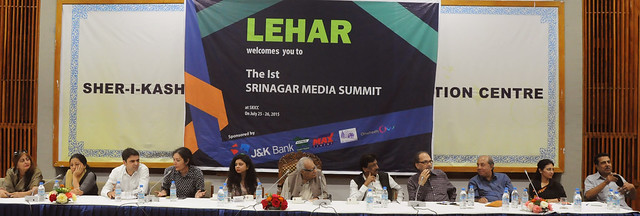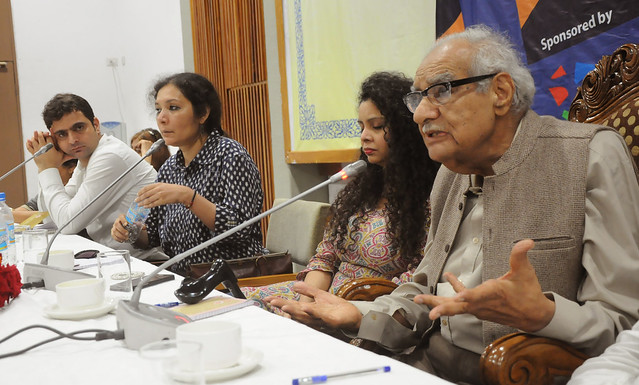By TwoCircles.net, Staff Reporter
Srinagar: Senior Consulting Editor with Doordarshan , KG Suresh, on Saturday July, 25th noted that Indian media has left covering news in investigative sense and is deeply involved in breaking news syndrome.
“Superficial coverage is in whole Indian media because research is not encouraged due to breaking news syndrome,” said Suresh while addressing a two-day Media Summit held in Srinagar, which was organized by an NGO, Lehar at Sher-i-Kashmir International Conference Centre (SKICC).

“Journalists should remember that covering Bhopal and Nepal is different. It was our lack of sensitivity that good work of India was lost in Nepal. Indian Journalists were beaten up and OB Vans were stoned. Indian journalists seriously need some orientation. They need to study the basics again,” said Suresh.
The Summit was held to discuss the portrayal of Kashmir in Indian media.
Nidhi Kulpati, reporter of NDTV shared her experience while performing her services in Kashmir.
“Such is the condition that when I came in Kashmir during elections to talk with youth, they refused saying that we (media) will portray them as stone pelters.”
Shahid Sidiqi, a prominent journalist castigated the role played by section of Indian media contrary to the role it should have played.
He said: “There is a section of Indian media which can even lead the country to war with Pakistan. Media many times don’t understand Kashmir and many times don’t want to understand it.”

About coverage of Indian media in Kashmir, he said: “It is not only you who think media is not doing justice with your society but every section in India society. Media always speaks half truth.”
Gowhar Geelani, roving editor, Newspaper Rising Kashmir while speaking at the event alleged that the language employed by Indian Media is to criminalize a legitimate political opinion and aspirations of Kashmiris.
“The problem is not about the coverage, but about the language that is being employed to criminalize a legitimate political opinion and aspiration of Kashmiris. There are attempts to distort facts and report Kashmir from a security prism, etc.”
He said, “During the anti-India protest demonstration of 2010, as many as 120 persons, mostly boys in their teens and sections of Indian media chose to describe those killed as stone-pelting agitating mob; not human beings or teenagers. During the devastating floods of 2014, one million Kashmiris were rendered homeless, but sections of Indian media instead of reporting colossal humanitarian crisis chose to do PR for army men to present them as saviours, when many of them stand accused of war crimes in Kashmir. Similarly, two boys were killed by army in November 2014 in Budgam when volley of bullets pierced the car in which they were traveling and one Indian newspaper reported that two ‘terrorists’ were killed without cross checking the facts who later turned out be innocent local youths.”
Saba Naqvi, political editor with Outlook magazine while addressing the people told that Indian media is selective not only in Kashmir but in entire country.
Advocate Deepika Rajawat, a Kashmiri Pandit emphasized journalists to be bold while portraying the truth.
“Journalism is no good in Kashmir. Journalist should be bold and say whatever the truth is, as they have responsibilities,” said Rajawat.
Kuldip Nayar, veteran journalist, author and peace activist spoke at length about the Kashmir Problem.
Pondering over the current situation of Jammu and Kashmir Nayar quoted Pakistan Prime Minister, Nawaz Sharif as saying, “Neither you can give us Kashmir nor will we give it to you. So let’s only have a discussion.”
Nayar said one solution would be that India and Pakistan should give autonomy to the region holding on to Defense and Foreign Affairs.
“Kashmir is an integral part of India and there can be no compromise on Indian democracy and secularism,” he said, adding, “The real Kashmir practices Sufism which has its roots in moral values but people’s attitudes are changing slowly.”
He said, “For 3.5 crore Kashmiris, we Indians can’t hurt majority Indian. We Indians will fight for secularism but Pakistan also should do same. India will save secularism from Kashmir to Kanyakumari.”
(With inputs from Rising Kashmir )

